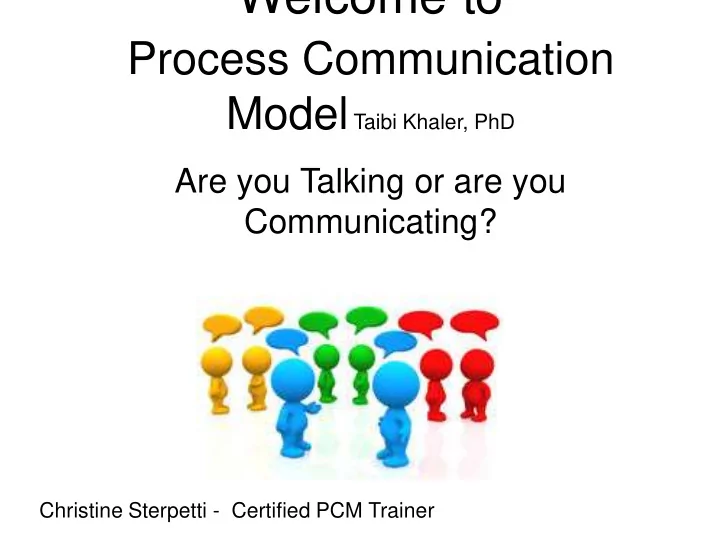

Welcome to Process Communication Model Taibi Khaler, PhD Are you Talking or are you Communicating? Christine Sterpetti - Certified PCM Trainer
1) Helps us to know ourselves better 2) How we interact with the world 3) A useful tool to help us identify the most effective style of communicating with someone 4) How to predict and identify a person’s distress behaviors 5) Implementing distress intervention tactics What I Mean What I Understand M Message M Feedback Sender Recipient
Perceptions Personality Structure Psychological/Motivati Distress Behaviors onal Needs Personalities Types Distress Sequences
Every person views the world around them in 6 different ways which correspond to 6 fundamentally different perceptions.
url Thought (facts) 25% of population Logical, 75% men Responsible, 25% women Organized pointslogical lllllo logical ,respnsir esponsible, I think... org What options... Does that mean... Physcological Who, what, when, Needs: where... Recognition of work ...facts Structure of time ...information
Opinions (values) 10% of population Dedicated 75% men Observant 25% women In my opinion... Conscientious We should... I believe... rl ...commitment ...dedication ...trust Physcological Needs ...respect Recognition of work/contribution Recognition of conviction
Emotions 30% of population 25% men Compassionate 75% women Sensitive Warm I feel... I’m comfortable with... I care... I like... ...sad Physcological ...happy Needs: Recognition of person sensory
Reactions Text 20% of population 40% men Spontaneous 60% women Creative Playful WOW!!! fun slang phrases I love... Physcological Need: I hate... Playful Contact
Imagination 10% of population Reflective 40% men Imaginative 60% women Calm I imagine... ...I see... It comes to mind... Psychological I need to reflect... Need: Solitude
Action 5%of population 60% men 40% women Charming Adaptable Bottom line... Persuasive The objective is... Make it happen... Go for it... Challenge... Psychological Need: Excitement
Perceptions Personality Types Thinker Thoughts Opinions Persister Emotions Harmonizer Reactions Rebel In-actions Imaginer Actions Promoter
Personal Condominium IN-ACTION 1) We are born with our base. This does not change 2) by 7 years old a persons condominium is IMAGINER (imagination) structured 3) In the beginning Base and Phase are the same PROMOTER (1/3 of population base/phase) (actions) Long term (6 mo -2 years) intensive stress can cause a Phase change. Therefore our THINKER (thoughts) psychological needs change. Phase REBEL (reactions) PERSISTER (opinions) Base HARMONIZER (emotions) 0 10 20 30 40 50 60 70 80 90 100
Remember that.. If our psychological needs are not satisfied in a positive way, we will satisfy them in a negative way. Leading to non-productive and self destructive behavior. The 6 distress sequences are observable and predictable.
The Non - Communication When did you start I don’t not feeling feel good... well? I don’t know... Ok, but did it What do you start this How do I mean... morning or did know. I can’t how can you not it start a week remember... remember ago? doncanremem when it started? ber...
Distress Sequence - Thinker 1st Degree - starts using big words, hyper detailed. Manager - stops delegating 2nd Degree - Becomes frustrated and critical around time and those who do not think. Starts to Micro-manage 3rd Degree - Not able to think logically. Feeling of being worthless. Pushes other away.
Distress Sequence - Persister 1st Degree - starts using big words, starts asking complicated questions. Manager - notices only what is wrong 2nd Degree - Starts “preaching”. Becomes suspicious and critical of those that don’t believe like them. 3rd Degree - Doesn’t trust anyone. Abandons all others.
Distress Sequence - Harmonizer 1st Degree - Wants to please. Over adapts to others needs, loses self confidence Manager - Does not make firm decisions as needed 2nd Degree - Starts to make silly mistakes. Starts to self criticize and invites criticism from others. 3rd Degree - Their environment becomes dirty or disheveled. They “let themselves go.” Gets rejected
Distress Sequence - Rebel 1st Degree - Makes effort to understand. Manager - Inappropriately delegates 2nd Degree - Starts to blame. Becomes negative and complaining. Easily bored and vengeful 3rd Degree - “I’ll show them” attitude. Gets excluded
Distress Sequence - Imaginer 1st Degree - Isolates from the rest. Believes things will get done by themselves. Says, “yes” generically. Manager - No longer concentrates on what needs to be done 2nd Degree - Stops giving answers. Projects started but not finished. Feels inadequate or embarrassed. 3rd Degree - Gets isolated
Distress Sequence - Promoter 1st Degree - Stops helping others. Expects others to figure it out themselves’ Manager - No longer offers support - on your own 2nd Degree - Starts to manipulate. Starts arguments. Ignores or breaks the rules. 3rd Degree - Abandons others
Type Recognition of Thinker Rebel Playful Competence Contact Structure of (thoughts) (reactions) time Recognition Persister of contribution Imaginer Solitude Recognition (opinions) of conviction (imagination) Recognition Harmonizer Promoter of person Incident Sensory (emotions) (actions)
To Conclude... Recognize and positively satisfy our psychological needs Speak to my Base so as not to anger my Phase
Recommend
More recommend